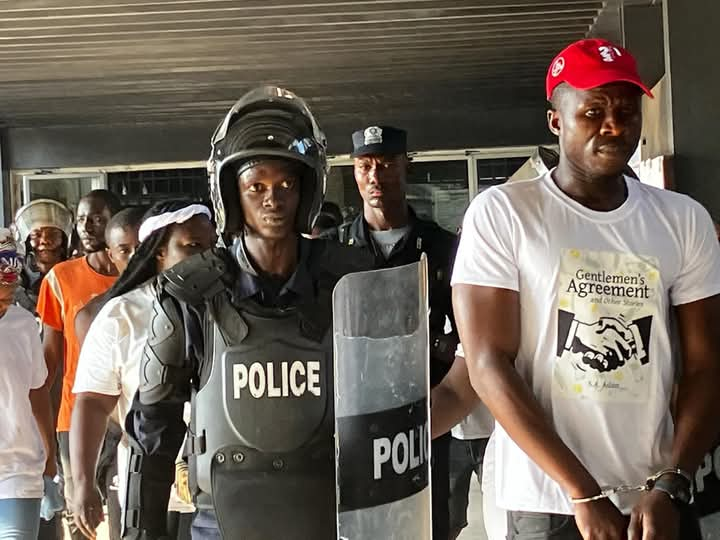On December 17, 2024, the grounds of the Liberian Legislature in Monrovia became a scene of intense conflict as riot police clashed with protesters demonstrating against the perceived unconstitutional removal of House Speaker J. Fonati Koffa. The demonstration, organized by “Concern Citizens for the Protection of the Constitution and the Rule of Law,” was led by former Grand Bassa County Superintendent, Janjay Gbarpbea, and drew a significant crowd of concerned citizens. The protest aimed to pressure President Joseph Boakai and Vice President Jeremiah Koung to refrain from interfering in the legislative process, specifically the removal of Speaker Koffa, which the protesters deemed illegal. The atmosphere quickly deteriorated into chaos as the protesters and police engaged in physical confrontations.
The Liberia National Police (LNP) responded with force, deploying tear gas and arresting approximately seventy individuals, including former Presidential Aide Sekou Kalasco Damaro. Those arrested were subsequently transported to the Monrovia Central Prison. The police’s actions were met with accusations of using live ammunition and inflicting casualties among the protesters; however, the LNP vehemently denied these allegations, asserting that they employed only non-lethal means to control the escalating violence. They maintained that their objective was to ensure the safety and security of the gathering and that force was only used after protesters initiated physical altercations with officers.
The escalating tensions saw several lawmakers present at the scene, including Representatives Frank Saah Foko, Yekeh Kolubah, and Eugene J.M. Kollie. Representative Foko, in a dramatic escape from the chaotic scene, scaled a fence separating the Legislature and Judiciary buildings, seeking refuge in the Monrovia City Court. He recounted being teargassed by the police, claiming he was merely being escorted to his office when the protest erupted. He remained in the court for several hours before his security detail arrived to escort him away.
The police, led by Inspector General Gregory Coleman, presented their version of events in a press conference following the dispersal of the protest. They reiterated the use of non-lethal force, such as tear gas, and attributed its deployment to the protesters’ resistance to police orders and initiation of physical altercations. They emphasized that designated protest zones were provided, but the demonstrators refused to comply, leading to the escalation of the situation. IG Coleman confirmed the arrest of over seventy individuals, who were being investigated and prepared for prosecution. He also highlighted the LNP’s role in providing medical assistance to some injured individuals.
Gbarpbea, the protest leader, emerged from the clash with a head injury and accused the LNP of using live bullets against peaceful demonstrators. He reiterated the protest’s objective of urging President Boakai and Vice President Koung to respect the rule of law and cease interfering with legislative affairs. He framed the police’s actions as a precursor to further chaos, particularly in light of the prevailing socio-economic hardships and unexplained deaths across the country. Gbarpbea subsequently announced the launch of a “Boakai-Koung step-down campaign,” demanding the resignation of the President and Vice President. He called upon all opposition political parties and concerned citizens to join the movement, promising further announcements regarding the campaign’s details.
The root of the unrest lies in the contentious removal of Speaker Koffa by a group of lawmakers aligned with the government, who designated themselves the “majority bloc.” They replaced Koffa with Representative Richard Nagbe Koon of the ruling Unity Party. This move has been met with strong opposition from the main opposition party, the Congress for Democratic Change, further exacerbating the political tensions within Liberia. The clash between protesters and police, the subsequent arrests, and the launch of the “Boakai-Koung step-down campaign” signal a deepening political divide and a potential for further unrest in the country. The conflicting narratives surrounding the use of force and the underlying political motivations behind the removal of Speaker Koffa contribute to a complex and volatile situation in Liberia’s political landscape.














